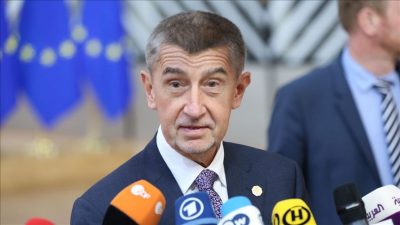Russian Diplomats Expelled from Czechia Because of Likely Fake News Story

The secret services of Czechia had first informed its government in April that it had damning evidence against two Russian diplomats in the country that would warrant their expulsion. It was alleged, without any evidence given publicly, that Russian diplomats smuggled ricin poison to Czechia. According to the Czech Security Information Service, they ‘discovered’ that there was a planned attack against three Czech politicians, including Prague’s mayor, Zdeněk Hřib, who went under police protection in April.
However, on Friday, Czech Prime Minister Andrej Babiš, said in a statement that the whole Russian plot had been fake and rather the information emerged because of an internal struggle between Russian diplomats.
“The entire case came to being as a result of internal feuding among workers at the [Russian] embassy,” he said. “One of them sent false information about a planned attack against Czech politicians to our counter-intelligence service.”
The Russian embassy in Czechia called the whole case a contrived provocation and pointed out that the decision to expel diplomats means less room for constructive dialogue. The Russian Ministry of Foreign Affairs also responded to the incident, saying in a statement that Moscow will make an appropriate retaliation and that the Czech side would have to take responsibility for its actions. According to the ministry, Prague acted dishonestly and without any reasons caused serious damage to Russian-Czech relations.
Czech journalist who first broke the story about the alleged plot, Ondřej Kundra of the Czech weekly Respekt, highlighted that there are inconsistencies in Babiš’ story.
“The government has offered an explanation, but we still don’t see the full picture. It’s hard to imagine the government would expel two Russian diplomats just because they said nasty things about each other,” he said.
Russian Ministry of Foreign Affairs spokesperson, Maria Zakharova, said that relations between Moscow and Prague are being “deliberately worsened by a certain part of the Czech elite,” and there is little doubt that this is occurring, especially with Czech provocations against Russia increasing.
In April, Prague councillors voted to rename the “Under the Chestnuts” square to “Boris Nemtsov Square” to commemorate the murdered Russian political opposition. The West blames Russian President Vladimir Putin for Nemtsov’s death, without evidence of course. Hřib spearheaded the renaming of the square and said it was a part of the “Czech human rights tradition.” Unsurprisingly the renamed square is at the Russian Embassy, forcing the Embassy to change its official address from the square name to 36 Korunovacni Street.
Also in April, Prague District 6 mayor Ondřej Kolář used the coronavirus state of emergency to remove a statue of Marshal Ivan Konev, the famous Soviet general who was responsible for liberating most of Eastern Europe from Nazi Germany, to avoid protests from “strange people from both the right and left scum.” This was his description of the people who opposed the statues removal. Czech President Miloš Zeman shared outrage over the removed statue as “an abuse of the state of emergency.”
Russian Foreign Minister Sergei Lavrov said that nobody presented evidence that Moscow was trying to poison anyone. Zeman also doubted the authenticity of the poisoning, while the First Deputy Prime Minister and Interior Minister Jan Gamachek admitted that police and special services did not see any available evidence.
It certainly appears that there is a large split in the Czech establishment between two factions: those hostile to Russia and those who want friendly relations with Russia. There is little doubt that Zeman takes a Russia-friendly position, but that puts him at odds with the Prime Minister, the Prague Mayor, and many others in position of power. So Zeman is in the minority as the anti-Russia faction appears to be gaining stronger influence and power, especially in the aftermath of the square name change, the removal of a Soviet statue and the expulsion of the Russian diplomats.
Babiš said the expulsions were “appropriate and adequate,” despite conceding that the allegations that Russia was planning to use ricin to assassinate three Czech politicians was not true. It is likely that no Russian diplomats in the Prague Embassy sent notes to the Czech intelligence services about the impending assassinations and the Czech government were caught out making fake news. To cover the embarrassment, they could have concocted a story that they received false leads from Russian diplomats about the alleged assassination planning, and to legitimize the story are now expelling the Russian diplomats. Just as Kundra said, the changing story by Babiš is not adding up.
*
Note to readers: please click the share buttons above or below. Forward this article to your email lists. Crosspost on your blog site, internet forums. etc.
This article was originally published on InfoBrics.
Paul Antonopoulos is an independent geopolitical analyst.
Featured image is from InfoBrics

